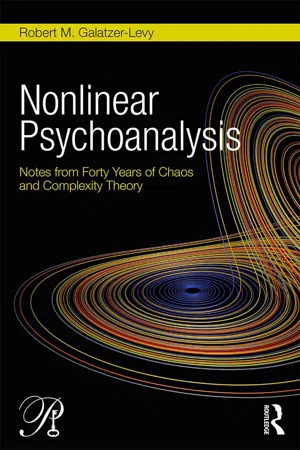
Nonlinear Psychoanalysis
Notes from Forty Years of Chaos and Complexity Theory
- 272 pages
- English
- ePUB (mobile friendly)
- Available on iOS & Android
Nonlinear Psychoanalysis
Notes from Forty Years of Chaos and Complexity Theory
About This Book
Nonlinear concepts from chaos theory, complexity studies, and fractal geometry have transformed the way we think about the mind. Nonlinear Psychoanalysis shows how nonlinear dynamics can be integrated with psychoanalytic thinking to shed new light on psychological development, therapeutic processes, and fundamental psychoanalytic concepts.
Starting with a personal history of the author's engagement with nonlinear dynamics and psychoanalysis, this book describes how his approach applies to diagnosis of psychological conditions, concepts of normal and pathological development, gender, research methods, and finally the theory and practice of psychoanalysis and psychodynamic psychotherapy. This book is full of new ideas about the basic nonlinear processes of human development, nonlinear views of gender and fundamental psychoanalytic process like working through, and the nature of the therapeutic process as conceptualized in terms of the theory of coupled oscillators. Galatzer-Levy questions many standard psychoanalytic formulations and points to a freer practice of psychoanalysis and psychoanalytic thinking. His new approach opens the reader's eyes to ways in which development and treatment can occur through processes not now included in standard psychoanalytic theory. The book not only provides useful theories but also helps readers take note of commonly passed over phenomena that were unseen for lack of a theory to explain them.
Galatzer-Levy brings an unusual combination of training in psychiatry, psychoanalysis, and mathematics to this unique study, which summarizes hisforty years of exploration of nonlinearity and psychoanalysis. Nonlinear Psychoanalysis will appeal to psychoanalysts and psychotherapists as well as students of nonlinear dynamics systems.
Frequently asked questions
Information
Table of contents
- Cover
- Half Title
- Title Page
- Copyright Page
- Dedication
- Table of Contents
- Introduction: Mathematics, Psychoanalysis, and the Human Sciences
- 1 A First Step—Qualitative Change from Quantitative Change: Catastrophe Theory Psychoanalysis
- 2 Characterizing Our Ignorance
- 3 Chaotic Possibilities: Toward a New Model of Development
- 4 An Example of Nonlinear Developmental Thinking
- 5 Good Vibrations: Analytic Process as Coupled Oscillations
- 6 Inexact Interpretations and Coupled Oscillators
- 7 Prediction and Self-Similarity
- 8 Emergence
- 9 On Working Through: A Model from Artificial Intelligence
- 10 The Nonlinear Clinician at Work on the Edge of Chaos
- 11 Afterwards and Forwards
- Bibliography
- Index